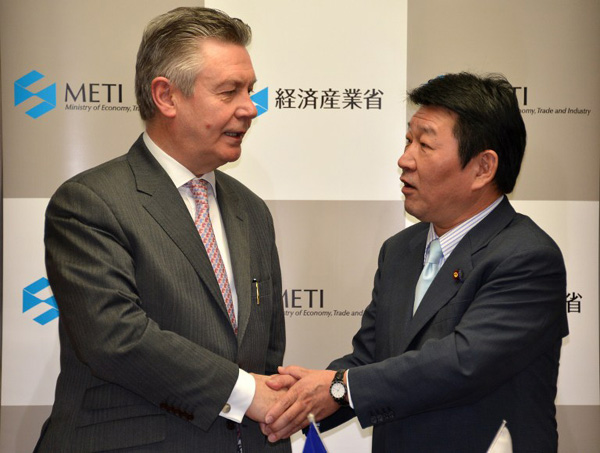
European Commissioner for Trade, Karel De Gucht, (L) shakes hands with Japanese Economy, Trade and Industry Minister Toshimitsu Motegi after their talks at Motegi’s office in Tokyo on March 25, 2013. AFP FILE PHOTO
BRUSSELS– The EU and Japan begin a first round of talks Monday on one of the world’s biggest free trade accords, part of a push to boost growth and get their faltering economies back on track.
Europe, like the United States, Japan and its other major partners are all looking for fresh momentum after the 2008 global financial blow-out morphed into the debt crisis and the worst economic downturn since the 1930s ‘Great Depression.’
Both sides have highlighted the benefits of an accord between them which would cover some 30 percent of global economic output and 40 percent of trade.
That is incentive enough to do a deal but it will not be plain sailing — there are considerable differences to overcome, not the least of them cultural, which will take hard bargaining to resolve.
“I consider that it is a matter of great significance,” Japanese Minister of Economy, Trade and Industry Toshimitsu Motegi said last month when the formal decision to start the talks was announced.
Japan is a big prize for EU exporters but they complain that its large market is skewed in favour of domestic producers, prompting Brussels to sound a note of caution.
The talks are “historic,” EU Trade Commissioner Karel De Gucht said last month, but the agreement “we have in our mind is a comprehensive one, tackling barriers and non-tariff barriers, public procurement (and) intellectual property rights.”
“It’s clear to me that dismantling the persistent non-tariff barriers will be the key for the success of the negotiations,” De Gucht said.
If a one-year review of the talks came up short, he warned, “the negotiations would be suspended.”
EU Trade Spokesman John Clancy said Friday the “agenda remains flexible” but market access, public procurement and intellectual property would likely figure early on.
Monday’s talks are “just the first round” of many, Clancy said, with the negotiations expected to take several years in all.
Japanese Prime Minister Shinzo Abe was elected earlier this year on promises of a radical shake-up for the country, still a major export power.
Japan has been in the doldrums for years since its ‘bubble economy’ collapsed in the early 1990s, with successive governments failing to get it moving again despite spending trillions.
Meanwhile, highlighting the increased pace and interest in trade as an economic saviour, the United States gave Japan the green light Friday to enter negotiations on a Pacific trade agreement.
In this case, Japan is seeking to join the 11-nation, US-backed Trans-Pacific Partnership — another potentially huge combination which brings in among others Australia, Canada, New Zealand and Peru.
US President Barack Obama has championed the TPP as a way to boost the US economy and also to build a US-backed order in a fast-growing region where China — which is not part of the talks — is gaining clout.
As well as Japan, the EU is also about to begin negotiations on Free Trade Agreements with the United States while talks are ongoing with Canada and India, and the Mercosur countries of Latin America among others.

